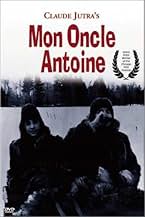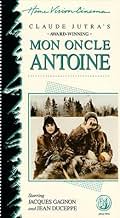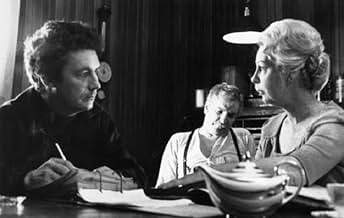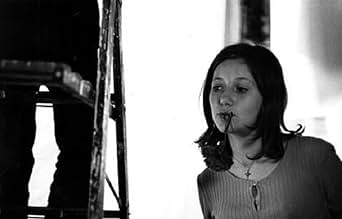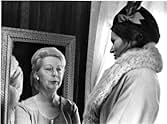Füge eine Handlung in deiner Sprache hinzuSet in cold rural Quebec at Christmas time, we follow the coming of age of a young boy and the life of his family which owns the town's general store and undertaking business.Set in cold rural Quebec at Christmas time, we follow the coming of age of a young boy and the life of his family which owns the town's general store and undertaking business.Set in cold rural Quebec at Christmas time, we follow the coming of age of a young boy and the life of his family which owns the town's general store and undertaking business.
- Auszeichnungen
- 6 Gewinne & 2 Nominierungen insgesamt
- Le cure
- (as René Salvatore Catta)
Empfohlene Bewertungen
It would be far too easy to resort to stereotypes, clichés and single-minded myopic statements in this story. Yet the director chose to skip the forced imagery and instead, focused on the essence of life in rural Québec of the time. That makes this film exceptional in its authenticity while not being pretentious in its presentation. If only more contemporary cinematic endeavors would do the same, the viewing public might not be forced to choose between the over-hyped Hollywood Pablum that passes for 'Must See' viewing.
Mon Oncle Antoine is - in every sense of the word - unforgettable. It will leave a lasting impression on anyone who has ever lived in - or visited - Québec. A classic. **********************************************
Follow-up: 10 May 2008
After reviewing some of the comments, it's worth noting Mon oncle Antoine is NOT - and probably wasn't MEANT to serve as standard Hollywood/American cinema for mass market sales. A coming of age story, yes, but far more than simple memoirs of adolescence in 1940's Québec. Viewers who're looking for sheer entertainment at the expense of complex development of the characters will be sorely disappointed. Go watch action/adventure/romance/comedies to be amused. Watch Mon oncle Antoine to be drawn into a seldom seen, but absolutely remarkable society that has been overlooked and ignored for far too long.
The Grapes of Wrath is hardly an edge-of-the-seat thriller, yet the story and characters are what makes this American classic an enduring film. Mon oncle Antoine is in the same genre.
Looking through the eyes of a teenage boy Benoit (Gagnon), Jutra's ethnographic artwork assiduously records what he sees and experiences in a few days' span, Benoit's uncle Antoine (Duceppe) and auntie Cécile (Thibault) run a general shop but also manage the town's undertaker business, a funeral ceremony near the beginning presided by Antoine and his shop clerk Fernand (Jutra himself, oozing with assured apathy) subtly conveys a ghost of friction between them, soon an overtly uncomfortable shot of Fernand and Cécile's encroaching closeness hints something smack of a tacitly connived adultery is on the sly, maybe that's why. On the Christmas Eve, townsfolk gather in the shop to see the Christmas display and purchase gifts, a young couple announce their engagement, a voluptuous wife comes to try on her ordered corset, by default becomes the cynosure, on the same floor, intrigued by his awakening curiosity of the other sex, Benoit fumbles around Carmen (Champagne), a comely girl of his age who also works in the shop, a budding puppy love is always adorable.
Still, even at Christmas, people die, Madame Poulin's (Loiselle) eldest son dies that day (the cross overhangs is jarringly prominent in that frame of pathos), and Benoit is permitted, for the very first time, to go with Antoine to pick up the body, to-and-fro, it is a sortie saddled with abundant snow, piercing coldness, influence of liquor, and an ingenuous teen's rite-of-passage to face death at point-blank range and saver his first taste of misery, deception and dissatisfaction from the adult world. From excited to dismayed, then exasperated, the non-professional Jacques Gagnon exerts devoted commitment during the key sequences where a crepuscular snowscape unremittingly precipitates viewers' body temperate to slump with the characters on the screen when riding through the rigors of a wintry night, during which, a snowfield face-off between Benoit and the old soak Antoine lets the emotional punch kick in, a lifetime of disappointment is encapsulated by Duceppe's drunkard hurling, especially when it is closely followed by what is happening inside Cécile's cozy boudoir, life is never fair and it is a miracle how can we not all succumb to be cynical and misanthropic after being buffeted by the bread-and-butter blues.
That is the damning feeling encircles Jutra's unflinching realism-inflected enterprise, it is boldly unsentimental, but also alarmingly despondent, that's how it reaches the finish-line, whatever Benoit sees through the windowpane, real or fanciful, this Bildungsroman of an impressionable boy can only descend further into uninviting harshness, much as the film's natural backdrop, MON ONCLE ANTOINE is more congenitally formidable than heartfelt compelling, but that's also where lies its enduring strength!
Set presumably in 1940s rural Quebec, the story explores the developing consciousness of young Benoit as he learns to deal with both sexuality and death.
The look of the film is astonishing, especially seeing as a high proportion of criticism towards Canadian cinema by the general public surrounds aesthetics. Beyond this, the unassuming Benoit is a seductive protagonist for the audience, looking at his corrupting community with fresh an innocent eyes.
I recommend reading Jim Leach's critical essay on the film in Canada's Best Features for anyone looking to place the film into a historical context while also dissecting the form of the film. Definitely check this one out.
The story centers on the experiences of fifteen year old Benoit, an orphan living with his uncle and aunt who run a general store, as well as a funeral parlor. Also living there is Carmen, a young woman of Benoit's age. Most transitions from adolescence to adulthood take years, but Benoit goes a long way to making that transition in a matter of a couple of days. The events that transpire in those days change Benoit from a rather carefree innocence to a sober appreciation of the complexities of life and death. We are witness to the joys, frustrations and sorrows of the people we meet.
Benoit's youthful experiences are universal in the large (sexual awakening, death, duplicitous behavior, dashed expectations), but they are unique to him and that uniqueness is what makes coming of age stories ceaselessly interesting. There is a scene where Benoit is chasing Carmen around among the caskets (such life amid the symbols of death) and he finally catches her as she falls to the ground. He puts a hand on her breast, exciting for him even though she is fully clothed. What happens then is one of those moments that make these experiences unique--neither Benoit nor Carmen knows quite what to do at this juncture and they wind up just staring at each other. If you cannot appreciate such a tender scene, then you will likely not appreciate this movie.
Several themes lurk in the background. One is the friction that exists between the French and English speaking peoples of the province. After finishing a beer in a bar, one of the French Canadians says, "That's one that the English will not get." The bitterness between the English speaking Quebecers and the francophone Canadians is brought home in the scene that has the English speaking mine owner tossing cheap Christmas gifts into the snow from his horse-drawn carriage. The harsh life of the mine workers is portrayed with just enough emphasis to make the point. The ugly and oppressive presence of the asbestos mine casts a somber shadow over the entire proceeding, particularly given the health consequences of the mineral.
Director Jutra chose Jacques Gagnon from the townspeople to play the role of Benoit, instead of casting a professional young actor for the role. I think this turned out to be a fortuitous choice, since Gagnon gives a surprisingly natural performance, aided by some skill-full camera work. Many of the local townspeople appear in the movie, adding to the feeling of authenticity; the use of natural lighting adds to this as well.
Several people have accused this movie of having no plot. I am always puzzled what such people mean by that. This movie presents a sequence of interrelated events leading to a dramatic final scene. To me that is a plot. I wish some of these plot deniers would spell out what they mean by their comment. Maybe I could see the charge sticking when applied to a movie like Warhol's "Empire" (a continuous shot of New York's Empire State Building for eight hours and five minutes), but not to this movie.
I found this engaging and altogether worthwhile.
The film meanders amiably along, capturing in unhurried pace the life of rural 1940's Quebec, in this case an asbestos mining town. The main characters are Benoit, an orphaned boy, the local undertaker Antoine and his assistant Fernand played by the director himself Claude Jutra. Eventually the film reaches its big set-piece, a long, extended night sequence where Benoit and Antoine (covered in furs) must traverse the icy, snow covered landscape via sled to retrieve the body of a boy who has died at a farmhouse.
The director was hailed as the new savior of Canadian cinema at the time of release, but unfortunately never achieved the level of success later on that he did with this film. He mysteriously disappeared one winter and his body was discovered the following spring after the ice had thawed...a simple note attached, "My name is Claude Jutra".
Wusstest du schon
- WissenswertesThe film is included on Roger Ebert's "Great Movies" list.
- Zitate
Benoit: [Benoit and his uncle Antoine try to recover a casket that has fallen off their sleigh. Antoine is in a drunken state] Don't let go!
Uncle Antoine: I can't, Benoit. Sometimes you just can't.
Benoit: Yes, you can! My arm's in a cast and I can do it. We're almost there. Don't give up. You can do it.
Uncle Antoine: [Dejectedly, and in a drunken stupor] What am I doing here, Benoit? I'm not happy. I'm not made for the country. I hate it here. I wanted to buy a hotel in the States. Your aunt wouldn't let me. She says no to everything. I'm afraid of corpses. I've been afraid of corpses for 30 years! I work for everybody. Your aunt never gave me a child. I have to take care of other peoples' children. I raise Carmen and you. Haven't I done all I could for you?
Benoit: Drunkard.
[Uncle Antoine breaks down, sobbing. Benoit looks at him with contempt]
Benoit: Drunkard!
[Sobbing continues]
- Crazy CreditsThe actor who plays the Big Boss is billed as Georges Alexander in the original French language version, but as George Alexander in the dubbed English version.
- VerbindungenEdited into 50 ans (1989)
Top-Auswahl
- How long is My Uncle Antoine?Powered by Alexa
Details
Box Office
- Budget
- 750.000 CA$ (geschätzt)
- Laufzeit
- 1 Std. 44 Min.(104 min)
- Sound-Mix
- Seitenverhältnis
- 1.33 : 1

